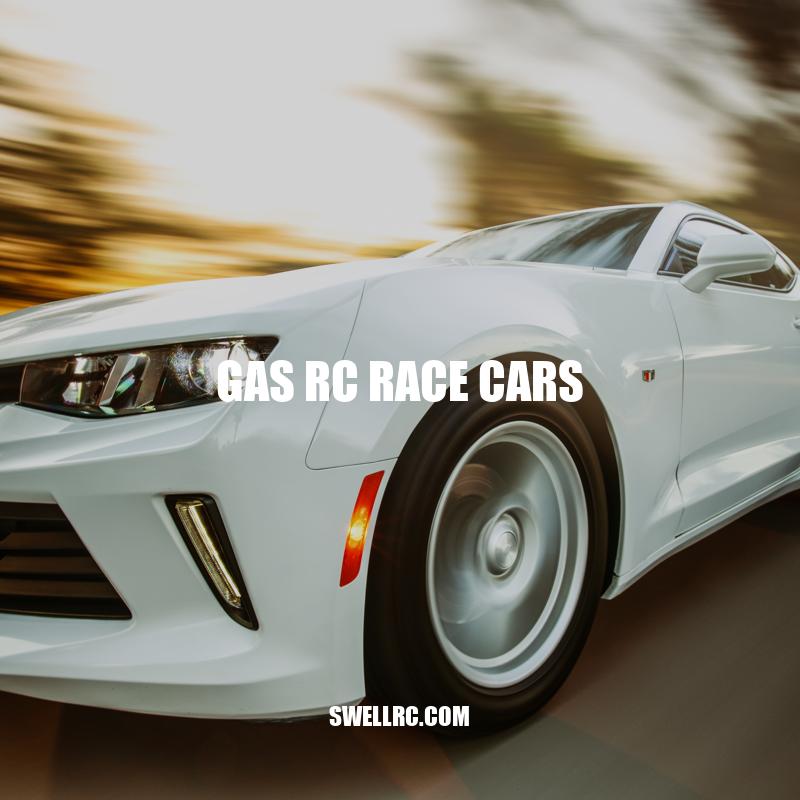Gas RC Race Cars: A Comprehensive Guide
Gas RC Race Cars: Everything You Need to Know
Gas-powered remote-controlled (RC) race cars have become one of the most popular hobbies in the world today. These tiny cars running at breakneck speeds have captivated the hearts of enthusiasts who want to experience the adrenaline and excitement of racing. Gas RC cars are perfect for those who want to experience racing but do not have the means to buy a real race car. They are not just a toy but a serious hobby that requires dedication, skill, and patience. Gas RC race cars are powered by miniature engines that run on special fuel instead of batteries or electricity. They offer a unique driving experience since the sound of the engine, and the speed can be controlled by the user. In this article, we’ll provide you with everything you need to know about these miniature wonders – from how they work, why they’re better than their electric counterparts, the different types of gas RC race cars, and how to get started with this exciting hobby.
Gas RC race cars operate in a similar fashion to real cars. Instead of running on gas or diesel, they run on nitromethane to power their miniature engines. Here’s how they work:
The Components of Gas RC Race Cars
- Chassis: It is the foundation of the car, which holds all other components together.
- Engine: It is the heart of the car, which propels it forward.
- Drive Train: It transmits the power from the engine to the wheels to move the car forward.
- Suspension: It helps to keep the car on the ground and maintain stability during the race.
- Radio Controller: The device that controls the car’s speed, direction, and braking.
The Fuel Used in Gas RC Race Cars
Gas RC cars use a specialized fuel called nitro-methane. It is a mixture of methanol, nitroethane, and oil that is specially formulated for internal combustion engines. It is available in different nitro-percentages ranging from 10% to 40%, depending on the engine size and type of racing.
Basic Steps on How to Operate a Gas RC Race Car
- Fill up the Fuel Tank: Fill up the fuel tank of the car with the correct nitro content.
- Start the Engine: Turn on the engine using the electric starter or pull starter, depending on the model.
- Drive the Car: Use the radio controller to control the speed, direction, and brakes during the race.
- Monitor the Fuel Consumption: Keep track of the fuel level and refill when needed to avoid engine failure.
- Care and Maintenance: Clean and maintain the car regularly after each race or use to prevent wear and damage.
Overall, gas RC race cars operate like miniature versions of real cars, providing an exciting and unique racing experience. If you’re interested in getting started with gas RC race cars, there are various resources available online, such as hobby shops, racing communities, and online marketplaces where you can purchase gas RC cars and accessories.
What do gas RC cars run on?
Gas RC cars run on a mixture of nitro-methane, methanol, and oil. The exact ratio of these components can vary depending on the specific model of RC car. Gas-powered RC cars have the advantage of being faster and more powerful than electric RC cars, but they are also generally more expensive and require more maintenance. Some popular gas RC car brands include Traxxas, HPI Racing, and Kyosho. Websites such as Amazon and Hobbytron offer a variety of gas-powered RC cars for sale.
| Components | Ratio |
|---|---|
| Nitro-methane | 10-40% |
| Methanol | 40-60% |
| Oil | 10-22% |
- Gas-powered RC cars are faster and more powerful than electric RC cars.
- Gas RC cars require more maintenance than electric RC cars.
- Popular gas RC car brands include Traxxas, HPI Racing, and Kyosho.
- Websites such as Amazon and Hobbytron offer a variety of gas-powered RC cars for sale.
Why Choose Gas RC Race Cars Over Electric?
When it comes to remote-controlled race cars, there are mainly two types: electric and gas-powered. While each has its own pros and cons, gas RC race cars offer several advantages over electric ones. Here are some reasons why you may want to choose gas RC race cars:
Comparison of Gas to Electric-Powered RC Race Cars
Gas RC Race Cars Electric RC Race Cars
High top speeds and acceleration Lower top speeds and acceleration
Realistic engine sound and smoke Minimal or no sound
Longer racing times with bigger fuel tanks Shorter racing times with limited battery life
More challenging for experienced racers Easier for beginners
Advantages of Gas RC Race Cars over Electric Ones
– Realistic Sound and Driving Experience: Gas-powered RC race cars mimic real cars in terms of engine sound and smoke, providing a more immersive racing experience.
– Higher Speeds and Acceleration: Gas engines are capable of reaching higher top speeds and acceleration compared to electric motors, making them more suitable for competitive racing.
– Longer Racing Times: Gas engines can run for longer periods with larger fuel tanks, which is more convenient than having to recharge electric batteries frequently.
– More Customization and Upgradability: Gas RC race cars offer more opportunities for modifications and upgrades, allowing racers to fine-tune their cars for improved performance and handling.
Unique Features of Gas RC Race Cars
In addition to the advantages mentioned above, gas RC race cars boast some unique features that appeal to serious racers or enthusiasts:
– Realistic engine sound and smoke that simulate actual racing cars.
– More challenging to drive and control, which adds to the thrill of racing.
– Greater attention to detail and design in terms of bodywork, paint, and decals for a more authentic racing experience.
So if you’re looking for a more authentic, challenging, and engaging racing experience, gas RC race cars might be the way to go. There are many brands and models of gas RC cars available online, including Traxxas, HPI Racing, and Redcat Racing, to name a few.
Are gas RC cars better than electric?
Gas RC cars and electric RC cars have their own advantages and disadvantages. Here are some factors to consider:
Gas RC Cars:
Advantages:
- Long run times
- More realistic sound and smell
- Faster top speeds
Disadvantages:
- Higher initial cost
- Higher maintenance costs
- Messier and more complicated setup
- Loud noise can be a disturbance
Advantages:
- Affordable initial cost
- Lower maintenance costs
- Clean and quiet
- Quick and easy setup
Disadvantages:
- Shorter run times
- Slower top speeds
- Lack of realistic sound and smell
- Battery life and recharging times can be inconvenient
Ultimately, the decision between gas and electric RC cars will depend on personal preference and specific needs. If you are looking for more realistic sound and longer run times, gas may be the way to go. If you prefer cleaner and quieter operation, electric may be the better choice. We recommend visiting websites such as www.HobbyTron.com or www.AMainHobbies.com to compare prices and product specifications for both gas and electric RC cars.
Gas RC race cars come in various models, sizes, and designs to suit different preferences and racing styles. Here are some of the most popular types of gas RC race cars:
Touring Cars
- Designed for on-road racing on smooth and flat surfaces
- Low profile and sleek design for better aerodynamics and stability
- Relatively smaller engines for better handling and precision
Off-Road Buggies
- Designed for off-road racing on rough and uneven terrain
- Bigger and wider wheels with off-road tires for better traction and grip
- Longer suspension travel for shock absorption and smoother rides
Trucks
- Designed for all-terrain racing and stunts
- Higher ground clearance and tougher suspension for better off-road performance
- Sturdier and more durable body frame to withstand jumps and crashes
Engine Sizes for Gas RC Race Cars
Gas RC race cars come with different engine sizes, indicated by displacement (cc) or engine capacity. Here’s a quick guide to the common engine sizes and their effects on car performance:
| Engine Size (cc) | Performance Characteristics |
|---|---|
| 1.6-2.5 | Suitable for beginners and casual racers; lower speeds and acceleration |
| 2.5-3.5 | Moderate power and speed; suitable for experienced racers and competitions |
| 3.5-4.6 | High performance and speed; suitable for professional or advanced racers seeking extreme speeds and acceleration |
Whether you prefer on-road, off-road, or all-terrain racing, there’s a gas RC race car out there that can match your skills and interests. Top brands in the gas RC car market include Losi, Team Associated, and Kyosho, among others.
What are the different types of RC vehicles?
The different types of RC vehicles include:
- RC cars
- RC trucks
- RC boats
- RC airplanes
- RC helicopters
- RC drones
Each type of vehicle is designed for a different purpose and comes with its distinct set of features, including speed, maneuverability, and range. Some popular RC vehicle brands include Traxxas, Team Associated, and Horizon Hobby. Websites like RC Planet and Tower Hobbies offer a wide variety of RC vehicles and parts for each of these types.
Upgrades and Modifications for Gas RC Race Cars
One of the exciting things about gas RC race cars is the ability to customize and upgrade them to match your racing style or performance needs. Here are some common upgrades and modifications that you can do to your gas RC race car:
Engine Upgrades
- Replace the stock engine with a more powerful one
- Add after-market mufflers or exhausts for better engine efficiency and sound
- Upgrade the fuel line, carburetor, and air filter for better fuel intake and combustion
Suspension Upgrades
- Upgrade the shock absorbers for better suspension travel and damping
- Replace the stock suspension arms, tie rods, and sway bars for sturdier and more adjustable ones
- Install after-market steering systems for more precise and faster steering response
Chassis and Body Upgrades
- Upgrade the chassis for better stability and weight distribution
- Replace the stock body with a lighter and more aerodynamic one
- Install after-market wheels and tires for better grip and traction on different surfaces
It’s important to note that not all upgrades or modifications are suitable for all gas RC race cars, and proper installation and tuning are crucial to ensure the car’s optimal performance and longevity. It’s recommended to consult with an experienced mechanic or a professional RC car shop for advice and services.
There are also many websites and forums dedicated to gas RC racing, such as rccaraction.com and rcuniverse.com, where you can find valuable information, reviews, and tips on upgrades and modifications, as well as connect with other gas RC race car enthusiasts.
How can I make my RC car race better?
To make your RC car race better, here are some tips:
- Check the suspension to ensure that it’s functioning properly.
- Ensure your tires have good grip and match the surface you’ll be racing on.
- Make sure that the weight distribution and balance of your car is optimized.
- Upgrade the motor for more speed and power.
- Install a high-quality battery for longer runtime.
- Adjust the gears to achieve the best combination of speed and acceleration.
If you’re looking for more specific advice or products to improve your RC car, websites like RC Driver and R/C Tech offer reviews and recommendations on various parts and accessories.
Getting Started with Gas RC Race Cars
If you’re interested in getting started with gas RC race cars, here are some things to consider:
Initial Cost
- A typical gas RC race car kit can cost between $300 to $1000, depending on the brand and specifications
- You will also need to purchase a transmitter, receiver, battery pack, and charger
- Additional costs may include a starter box, fuel, tools, and spare parts
Choosing the Right Model
- Consider your skill level and racing experience when choosing a gas RC race car model
- Some common factors to consider include the car’s top speed, handling, and durability
- You can also choose between on-road or off-road models, based on your preferred racing surface and style
Where to Buy
- You can purchase gas RC race cars from many online or brick-and-mortar retailers such as Amazon, Tower Hobbies, and Horizon Hobby
- It’s recommended to buy from reputable sellers or local hobby stores to ensure quality and customer support
- You can also join local or online RC racing communities to get recommendations or buy used gas RC race cars from other members
Maintenance and Care
- Proper maintenance and care are necessary to keep your gas RC race car in good working condition and prolong its lifespan
- You should clean the car and its components after each use, check for loose or damaged parts, and perform regular tune-ups as needed
- You can consult the car’s manual or online resources for more specific maintenance guidelines
Remember, gas RC race cars can be a fun and exciting hobby, but they also require patience, dedication, and constant learning. Joining a local RC racing club or attending racing events can help you improve your skills and meet other enthusiasts.
Conclusion
Gas RC race cars provide a unique and thrilling racing experience that cannot be found in other hobbies. From the sound of the engines to the realistic driving experience, gas RC race cars offer a level of excitement that is unmatched by other RC vehicles. They are a great way to spend time with friends, family, and fellow racing enthusiasts.
While starting with gas RC race cars can be intimidating, it can also be a fun and rewarding learning experience. By taking the time to select the right model, learn the basics of operation, and maintain your car properly, you can enjoy this hobby for years to come.
Whether you’re a seasoned RC racer or a beginner looking to get into the hobby, gas RC cars are a great option to consider. So why not give it a try and see what gas RC racing is all about?



